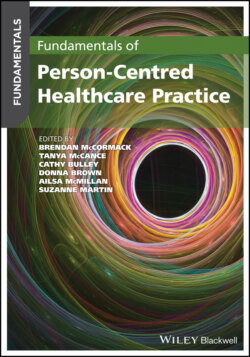Читать книгу Fundamentals of Person-Centred Healthcare Practice - Группа авторов - Страница 73
The importance of self‐knowledge for developing healthful cultures
ОглавлениеThe way we see ourselves and the world can influence how we see and relate to other people, and our beliefs and values can affect how we make decisions about healthcare (see Chapters 9 and 12). Thus, developing healthful relationships with the persons we care for and the persons we work with is at the heart of person‐centred practice. This requires awareness of self and others.
Health and social care practice can involve situations when difficult topics are approached during conversations between healthcare staff and the person, a significant other, a carer or a colleague. There are situations where the balancing of the risks and enabling choices and preferences may require ‘challenging’ or ‘courageous conversations’ (Masterson 2007), not only with the people we care for but with other members of the healthcare team who might have different opinions, values and beliefs (Seedhouse 2009). For these conversations to lead to better outcomes, knowledge and skills are required; for example, knowledge of the research evidence on the topic (see Chapter 32), communication strategies (see Chapter 8), interpersonal skills (see Chapter 10), and awareness of the strong emotions that might arise. To manage these situations and respond effectively, it can be helpful to be aware of those topics and behaviours that might trigger in us strong or negative emotional responses (Masterson 2007, p. 30).
When we feel that our personal self has been attacked (our ‘buttons’ have been pushed), processes are triggered through the amygdala to protect ourselves by rushing into action (fight‐or‐flight response) (Goleman 1996; Bruno 2011). To maintain professionalism in these situations, it is important to ‘cool down’. Emotional intelligence (see Chapter 10) helps us in this process. By acknowledging and listening to what our feelings are telling us and managing them more effectively to aid our logical thinking, we can regain perspective (through activation of the orbitofrontal cortex) (Goleman 1996; Bruno 2011).
Ways of cooling down include the following.
Look for alternative ways of explaining a situation (i.e. reframing a discussion).
Exchange negative thoughts for positive ones (i.e. use of thoughts and phrases that can help to shift the focus to something positive or pleasant).
Observe thoughts and feelings from a distance (i.e. practice of mindfulness).
Developing self‐awareness allows us to know ourselves better, to help make self‐regulation possible (to modify our behaviour, choose how to respond to a situation rather than following possible temptations) and to experience greater consistency between the way we behave and our attitudes. To become self‐aware, we need to reflect on what we experience when we focus, for example, on our sensations, perceptions, emotions, thoughts, attitudes, preferences and intentions (Morin 2011). Reflection is therefore a central skill in the development of self‐awareness.
